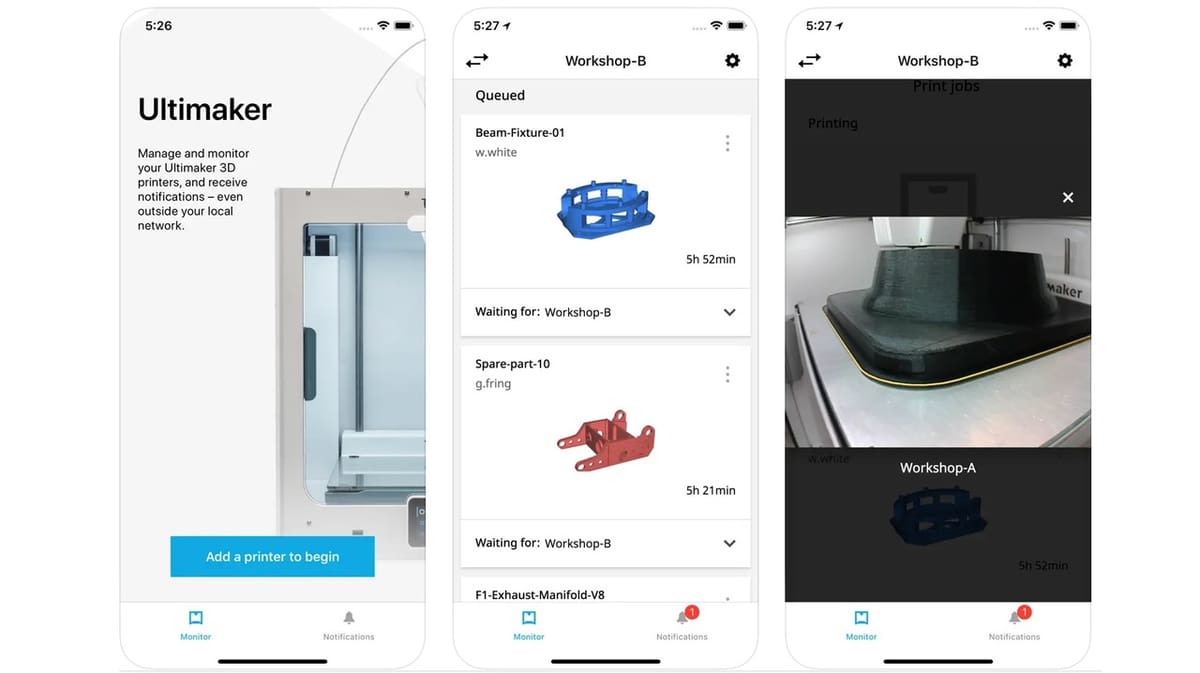Smartphones are a 3D printer’s best friend! The proliferation of 3D printing apps over the past few years has created many opportunities for makers to delve further into the hobby. Whether it’s controlling your printer or creating a 3D model to print, there are a plethora of apps out there that suit a wide variety of needs.
In this article, we’ve pulled together a list of apps across four different categories: 3D printer control, 3D design, 3D printable file repositories, and 3D scanning. Each app is designed to help make your 3D printing hobby easier and more accessible.
Without further ado, let’s dive in!
Considerations

In scouring app stores for the best options, we kept a few different things in mind. Here’s a look at the main criteria we used to shape our list:
- Ease of use: First, apps should be easy to use! Where a little more expertise is required, we’ll mention what you should have before you commit to a purchase.
- Features: Next, we made sure the app could offer some powerful features. A few of the options in the list do one thing really well, while others do a whole lot. We’ll discuss their capabilities and how well they perform.
- Standalone apps: Lastly, we weren’t looking for apps that were only one part of a whole package. Some require extra hardware to run properly, which could get pricey. We chose options that kept the extra hardware to a minimum.
Manufacturers' Apps

Many manufacturers offer apps that cater to their specific products and brands, letting their customers enjoy better accessibility. Here, we have a selection of handy apps provided by specific 3D printer brands to help you operate and monitor your machine straight from your pocket.
Creality Cloud
From the well-known 3D printer brand, the Creality Cloud app offers a comprehensive suite of features for 3D printing enthusiasts. Available for both Android and iOS platforms, it has an extensive library of 3D models and facilitates model trading within its community. Users can also engage with fellow enthusiasts through 3D printing communities and participate in print and paint contests.
The app also provides cloud-slicing capabilities, enabling users to send a file to slice models from a smartphone or tablet. Another capability is remote management and monitoring, where you can change print settings on the go and create time-lapse videos. Further utility is added through maker’s tools for crafting items like the Planet Lamp and Pen Holder. Premium features include free access to 200 paid 3D models, faster downloads, and priority slicing, enhancing the user experience. In terms of cost, the app is priced around $8 per month.
Bambu Handy
The Bambu Handy app, an offering from Bambu Lab, delivers a suite of user-friendly features for 3D printing enthusiasts. Available for both Android and iOS, it provides users with remote printer control capabilities, including remote set and management of the printer, error alerts, and detailed instructions to troubleshoot printing issues. The app has a high-resolution live view and automatic recording features, enhancing the printing experience. Additionally, its automatic timelapse functionality adds a creative touch to print monitoring.
A self-test program aids in diagnosing equipment issues, guiding users through checks to identify and resolve problems efficiently. Furthermore, the app provides access to MakerWorld, a repository that contains a vast collection of 3D models and allows one-step printing directly from the app, enriching the printing experience with a wide array of options. On top of that, the app is available for free.
UltiMaker
The UltiMaker app is designed to complement its network-capable 3D printers and is available for iPhone and iPad via the App Store for free. Key features include the ability to manage and control network-enabled 3D printers via a mobile interface, easy setup with automatic detection of UltiMaker printers, and live print status notifications even outside the local network.
The app aims to enhance the user experience by providing remote access and real-time updates on print jobs. However, as it was not updated in the last five years, it may be a bit outdated and not offer seamless results.
GrabCAD Print
The GrabCAD Print app, with versions for Android and iOS available for free, is designed to work with specific Stratasys FDM 3D printer models and PolyJet machines. It offers several key features: monitoring printer status, viewing job details, accessing the printer camera, checking material levels, and the ability to remotely stop an active print job.
This app is tailored exclusively for Stratasys printers, which cater to industrial applications and therefore may not be accessible to average hobbyists due to their specialized capabilities and higher cost. Consequently, the app’s target audience is primarily professionals and businesses utilizing Stratasys advanced 3D printing technology.
3D Printer Control
When the inspiration strikes, having a 3D printing remote control app can be useful. Start a print while you’re out and about, and come home to a completed print!
Obico

Just want someone to watch over your print in case the worst happens? Or maybe you’d like a heads-up when catastrophic failure turns your part into a plate of noodles?
Formerly known as The Spaghetti Detective (and before that, as Octoprint Anywhere), Obico’s OctoPrint remote access detects your print failures using a camera. In addition to detecting print failures, Obico lets you access, monitor, and control your OctoPrint-enabled 3D printer from anywhere, even outside your home network.
It can be added to your printer if you have OctoPrint already hooked up. As an OctoPrint plug-in, it’s amazingly easy to install and use. Getting started is as simple as installing the plug-in, signing up for an account with Obico, then linking your OctoPrint and Obico together. That’s it. Once installed, your prints can be monitored for potential failure so you can always keep an eye on things.
- Cost: Free
- Rating: 4.8/5 from 2,100+ reviews
- Requirement: OctoPrint-enabled 3D printer, webcam
- Platform: Android
Mobileraker
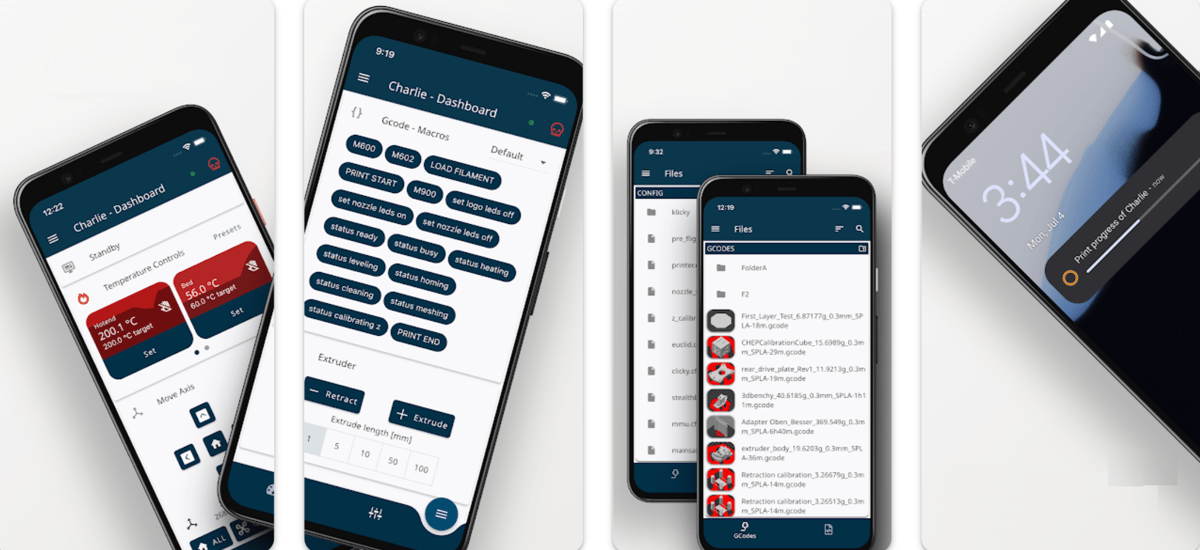
Mobileraker gives app users helpful 3D printer control using their phone as a UI for Klipper. With Mobileraker, you get access to many printer controls, including heater control and sending G-code macros. You’ll also be able to use mobile notifications with this app to make for an even smoother printing experience. A nice extra is that you can use a webcam viewer for machine monitoring through Mobileraker itself.
Users of Mobileraker rave that it’s intuitive and simple to use. Patrick Schmidt, the app creator, manages the GitHub page, which can help take care of many user queries, and he’s also very responsive to questions and concerns about the app. To top it all off, it’s a free app, so give it a go if you’re looking for ways to simplify your remote printer control needs!
3D Fox
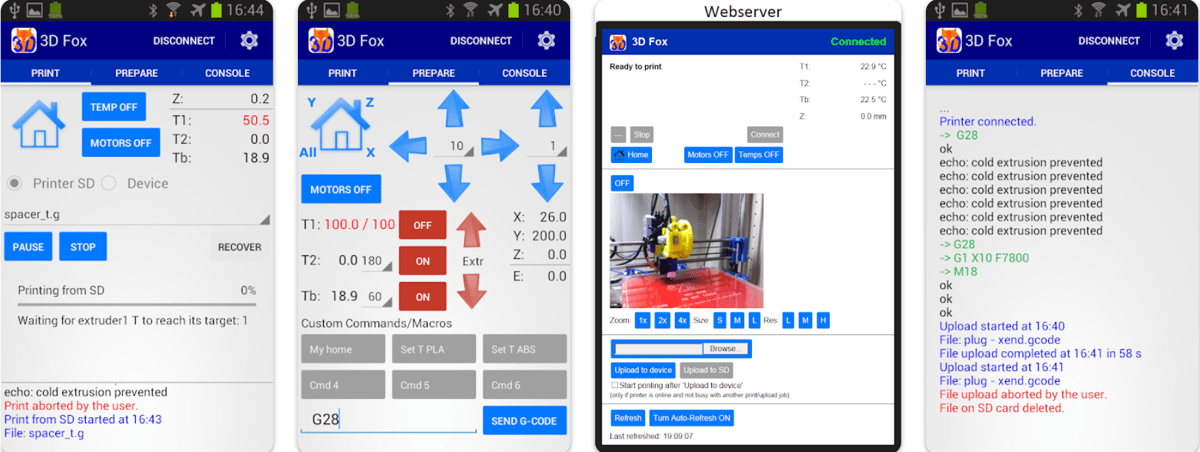
This handy Android-only app makes it an easy, streamlined process to monitor and control your printer using G-code from your phone. Connect to your printer via Wi-Fi or Bluetooth so you can send your printer directions from any spot in your home. The app creator reports that they developed it with a RepRap Prusa i3 and Arduino Mega 2560 with Marlin firmware, but many other hardware and software combinations should also work.
Aside from the basic controls, you can upload files directly from your device (maximum file size is 2 MB for the free version) or select files from the SD card to print. Users also report it’s handy for testing out 3D printer functions, and a nice plus is that the creator is responsive to queries via e-mail. Additionally, you can control multiple printers with this app as well, so it really can be an “all-in-one” solution.
Note that for 3D Fox to work, you will need to have either an Android device with USB OTG connectivity, a Wi-Fi module if you’re using Wi-Fi to connect, or a configured Bluetooth module.
AstroPrint
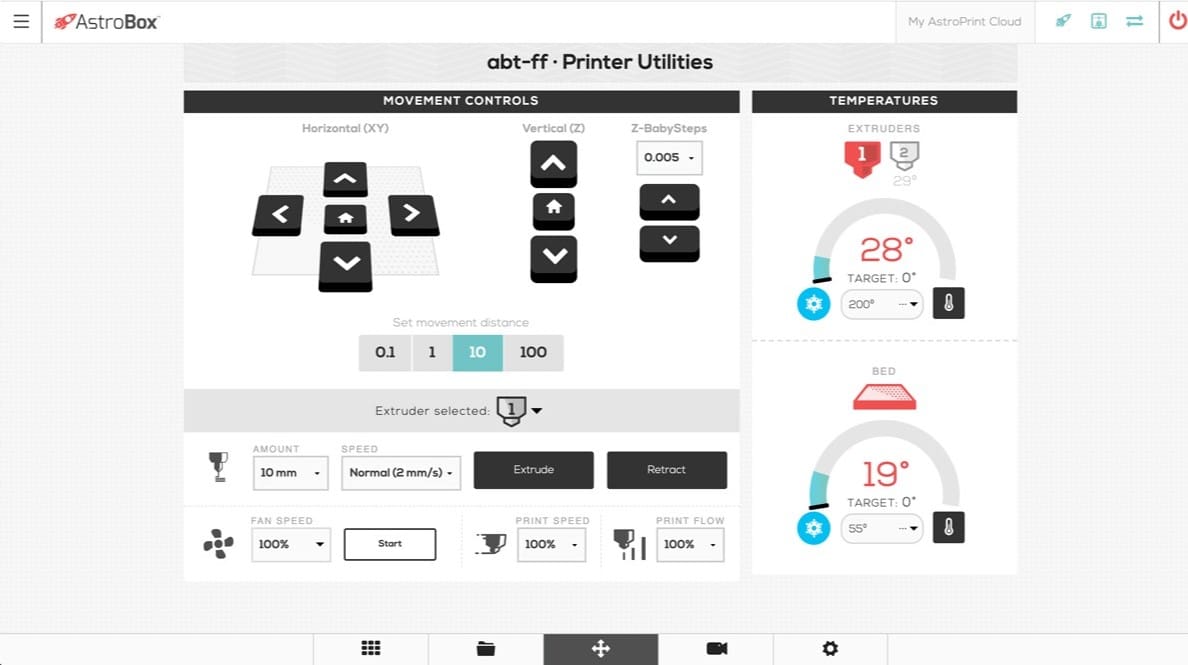
AstroPrint is an application similar to OctoPod and Printoid, but its focus is on multiple printers and business analytics. Full manual control is available, but the strength of the app lies more in its analytics.
AstroPrint works with both AstroBox-enabled 3D printers, as well as a variety of supported printer firmware. If your printer runs on compatible software, such as Marlin, Sailfish, or Repetier Firmware, then your printer is most likely able to work with AstroPrint. There is even an OctoPrint plug-in for it.
The app tracks all your prints and keeps a full history of the print and the slicer settings for successful and unsuccessful prints. Use AstroPrint to slice straight from the browser, have full remote control over printers, monitor prints live, and even manage print queues. You can adjust your printing profiles and reprint, all with one click. Keep track of filament and print time stats across all your printers, and use those to make decisions on expanding your 3D printer farm!
GCodePrintr
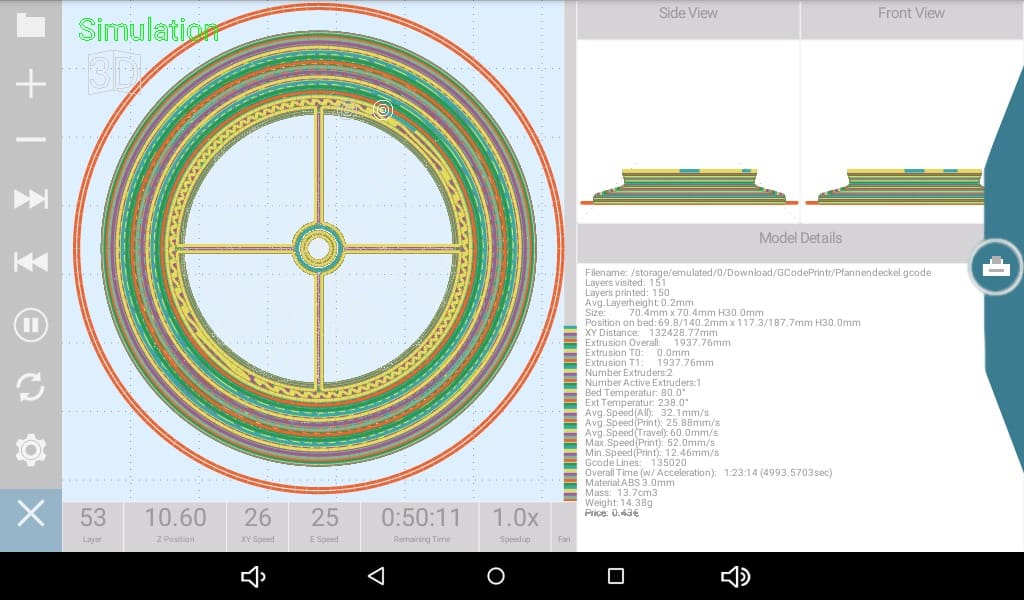
For those who don’t have a spare Raspberry Pi or AstroBox, GCodePrintr is another app that provides a full touchscreen interface for your printer. All you need is a USB OTG adapter, because GCodePrintr interfaces directly over USB, just like Pronterface or Repetier on your computer.
This app is developed directly for the common Arduino and RAMPS combo but will work on many other 3D printer control boards and firmware packages. If your printer supports it, the app can work over Bluetooth and Wi-Fi, too. Any Android device will do, so a spare phone could be your printer controller. Some users even used an Android TV box!
Aside from the common controls for your 3D printer, the app features a web server so you can control your printer over the web on your desktop or tablet. The app also provides a robust G-code simulator, which can be used to simulate a 3D print for testing and debugging purposes before you actually print.
GCodePrintr has an active community on MeWe, so any issues you may have with the app can be resolved there. The app is also open source, and the developer is happy to have others contribute to the project.
- Cost: ~$4
- Rating: 4.2/5 from 230+ reviews
- Requirements: None
- Platform: Android
3D Design Apps
What you can print is limited only by your imagination! Instead of sketching your ideas for a print on a paper napkin, try out one of these design apps.
SketchUp Go
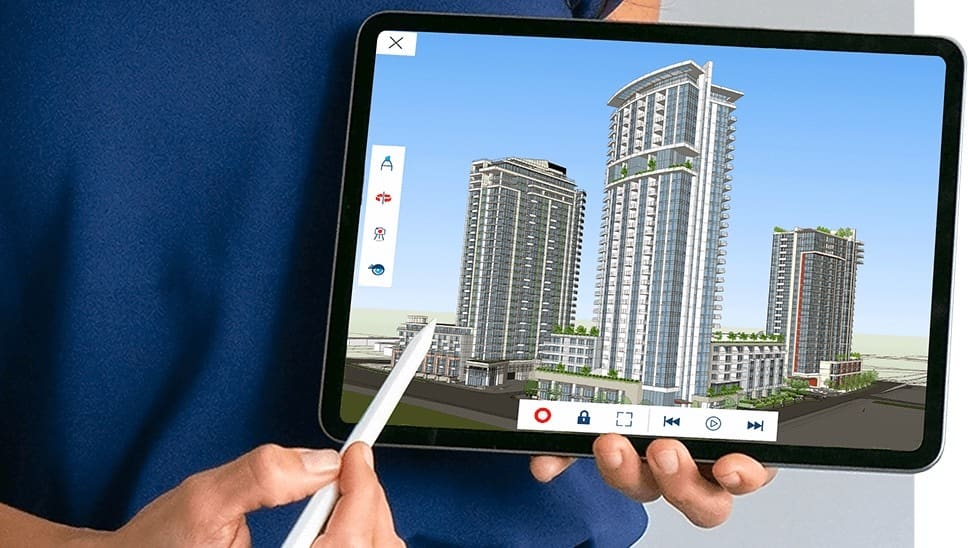
SketchUp Go, available for the web and iPad, is primarily focused on architectural design. However, its use in creating 3D printing models is growing consistently, and the software is very user-friendly, making it ideal for beginners.
Users can use the Apple Pencil combined with gestures to create designs with sketch-like freedom, starting from basic geometries and developing them to achieve more refined shapes. The app also provides Augmented Reality features that enable you to situate the model in the physical environment. You can export in STL, OBJ, and USDZ formats.
The free version only offers viewing features on iPad or iPhone, allowing users to develop models on the free web version and view them on mobile devices. However, the free version comes with limitations. For example, it doesn’t include Boolean Operations and the Solid Inspector, which is a tool to help you prepare models for 3D printing. The paid version provides those tools along with additional benefits, including unlimited 3D model downloads from the 3D Warehouse and unlimited cloud storage.
- Cost: Free, Go subscription ~$119 annually
- Rating: 4.5/5 from 11,100+ reviews
- Requirements: iPad, Apple Pencil
- Platform: iOS, web
Sculpt+
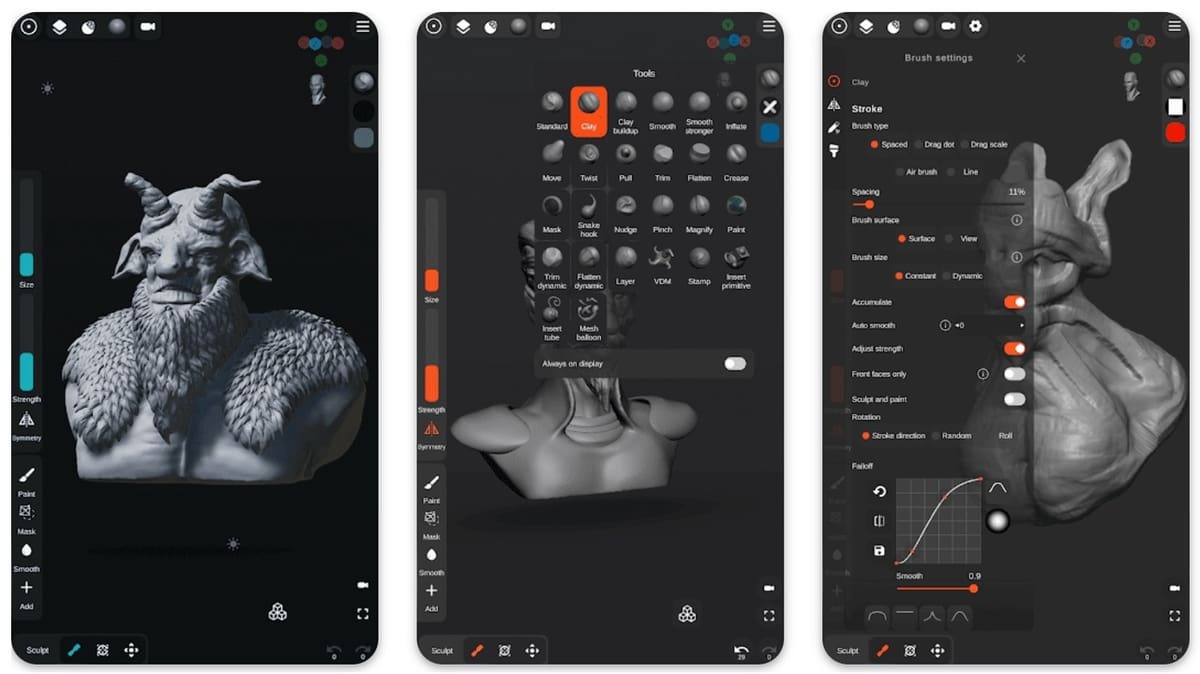
Sculpt+ is an intuitive digital sculpting and painting app that’s designed to bring the sculpting experience to your smartphone or tablet. It offers a variety of sculpting brush options and different primitives, providing a range of tools for creating organic 3D shapes and characters, such as this one from Razzakar and this one from CryptiqDiq.
A handy feature is the availability of ready-to-sculpt meshes, such as the Base head, allowing you to start on top of a pre-made geometry to speed up your work. The app supports stylus pens with pressure-sensitive capabilities. Besides that, it’s also possible to use PBR rendering straight from the app, and after you’re finished modeling, you can export it as an OBJ, STL, or GBL format, then slice and print.
- Cost: Free
- Rating: 3.5/5 from 5,000+ reviews
- Requirements: None, but a stylus is recommended
- Platform: Android
Shapr3D
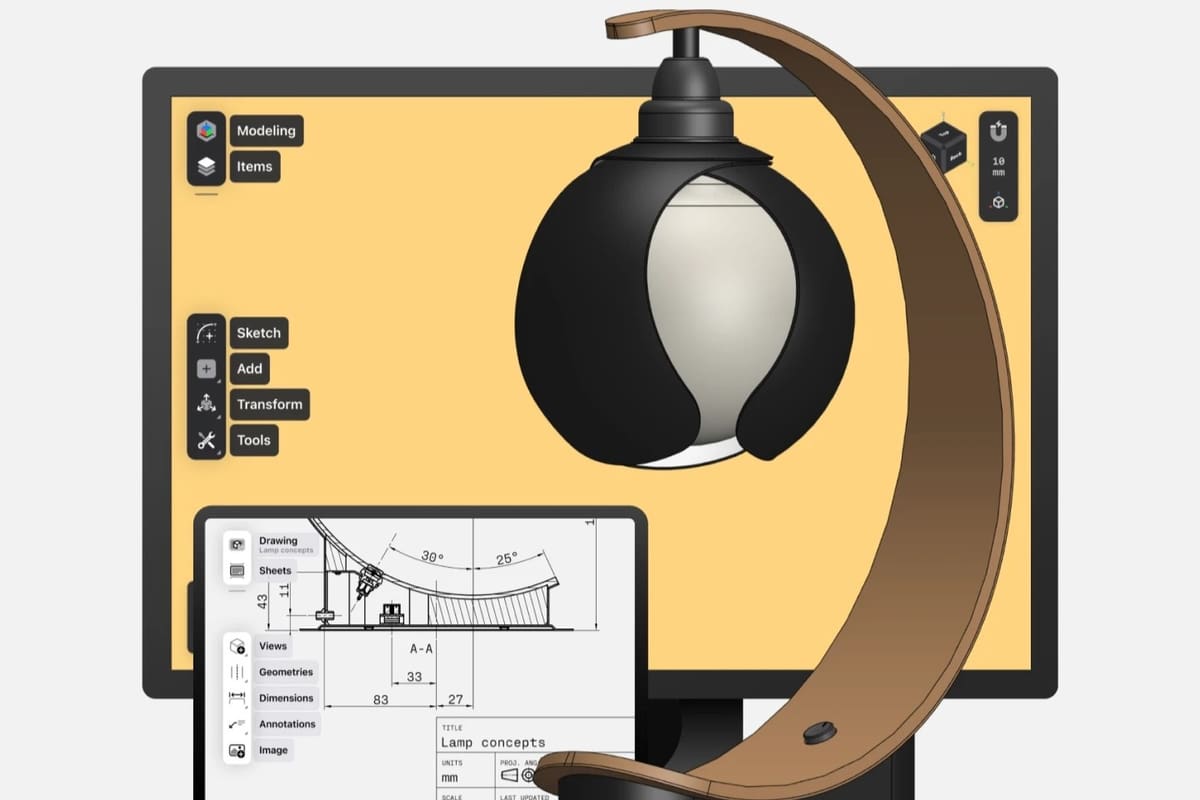
Shapr3D is one of the most powerful mobile CAD platforms out there. Designed specifically around the iPad Pro and the Apple Pencil, Shapr3D is meant to be a powerful yet intuitive app for creating CAD files. This makes it one of the easiest-to-learn CAD programs available, and new versions are even available for Mac and Windows.
The engine of this application is based on the same one that’s used in SolidWorks, meaning you get a smooth and responsive user experience. Beginners can also make use of their many in-app tutorials to become Shapr pros. Export support is available for STEP, STL, OBJ, 2D DXF, and more formats.
Requiring a monthly or annual membership, this app is among the priciest on this list. With that said, Shapr3D is one of the most highly regarded CAD apps on the App Store. You can try Shapr3D for free, but you’re limited to creating and exporting two designs. Any more than that, and you’ll have to fork out some cash.
- Cost: Free, Pro subscription ~$38 monthly or ~$300 annually
- Rating: 4.8/5 from 2,900+ reviews
- Requirements: iPad, Apple Pencil
- Platform: iOS
Onshape
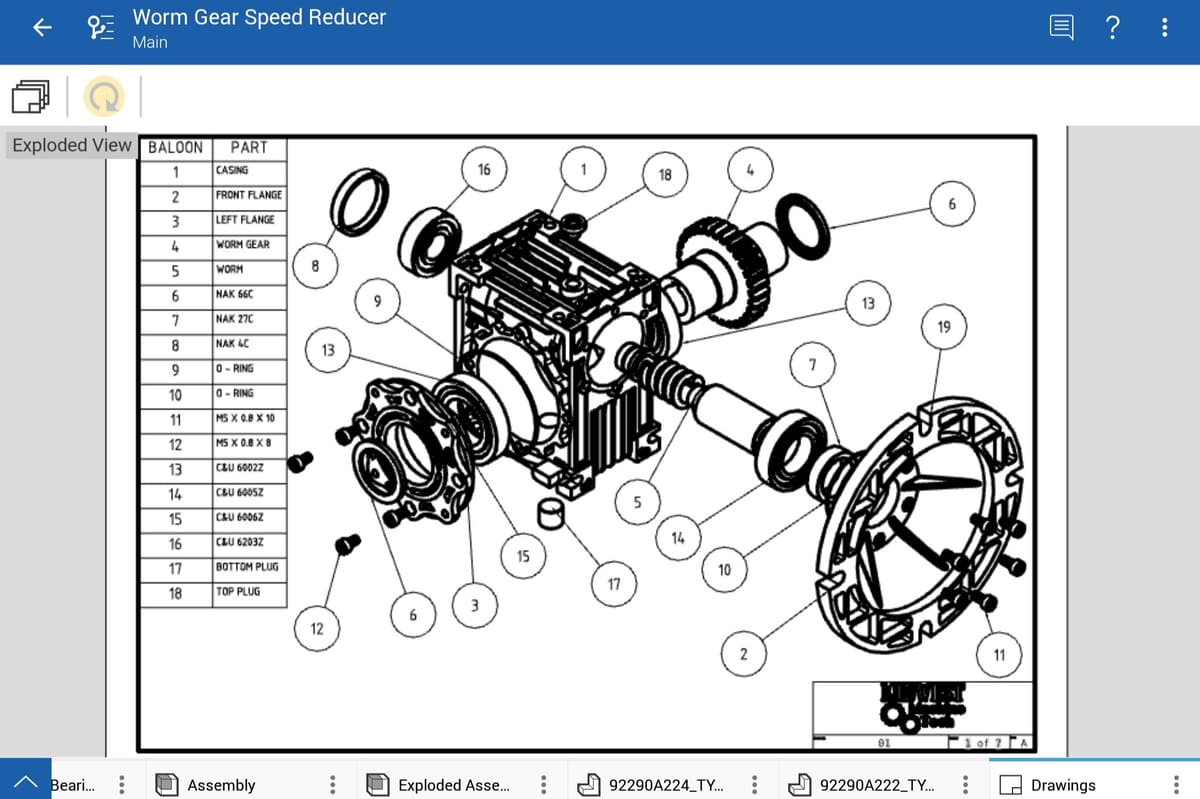
Onshape is another popular 3D modeling program. Unlike Shapr3D, it’s open for all mobile platforms by being cloud based. This means that you’re no longer limited to using a powerful mobile device like the iPad Pro. The multi-platform program lets you sketch up an idea on your phone while you’re on the go and seamlessly finish the design when you’re home at your computer.
The drawback is that you’ll need to be connected to the internet because the heavy lifting of this app is done through the cloud. That being said, this internet-focused application lets you share and collaborate with other makers easily and get help from the community when you need it. With Onshape, you can export in OBJ, STL, 3MF, and a variety of other file formats. The best part is that Onshape is completely free for makers and educators!
Putty 3D
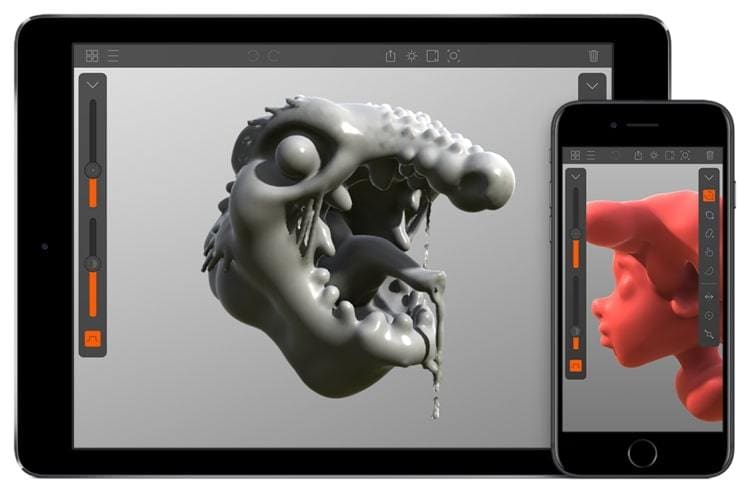
While Shapr3D and Onshape are great for mechanical assemblies, organic shapes like the human body are more difficult to model in CAD programs. 3D sculpting apps fill that void. Putty 3D is a great full-featured app for sculpting your 3D models. By using your fingers (or an Apple Pencil), Putty 3D features an intuitive control scheme and utilizes pressure-sensitive 3D touch on many iOS devices for a powerful experience that’s difficult to match on a computer without extra peripherals.
Once you’re done sculpting, Putty 3D also has a material rendering feature that allows you to apply different material characteristics to your model (e.g. ceramics, plastics, or metals). STL and OBJ exports are available, making it easy to go from a sculpt to a print. The organic shapes that Putty 3D excels at are especially great for resin 3D printing.
- Cost: ~$5
- Rating: 4.1/5 from 580+ reviews
- Requirements: None
- Platform: iOS
3D Printable File Repositories
Too lazy to model something yourself? Or are you looking for inspiration for your next print? Whatever the situation, you’re bound to find something to print on these file repository apps. (We assume you already know about Thingiverse).
3D Scanner App
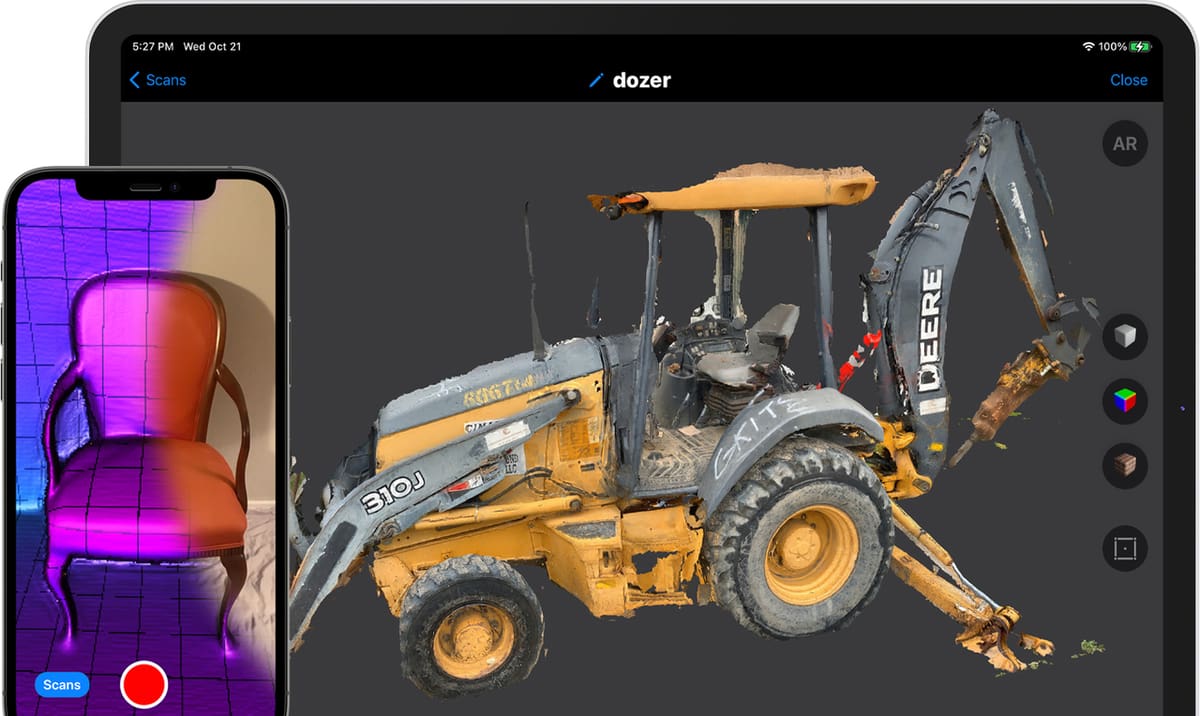
Just like its name implies, 3D Scanner App turns your mobile device into a powerful scanning tool. Utilizing the light detection and ranging (Lidar) capabilities of modern mobile devices, you can turn any object or space into a 3D model that you can easily save and share.
Although the app requires a Lidar-equipped device (such as an iPad Pro, iPhone 12, or higher), it produces color 3D models from everyday objects around you. Scans can be edited to perfection, then exported in file formats such as OBJ, GLTF, GLB, DAE, and STL formats. With no limitations, no sign-up required, and no internet connection required, this app is truly user-friendly.
- Cost: Free
- Rating: 4.8/5 from 26 reviews
- Requirements: Lidar-equipped device
- Platform: iOS
3Drop
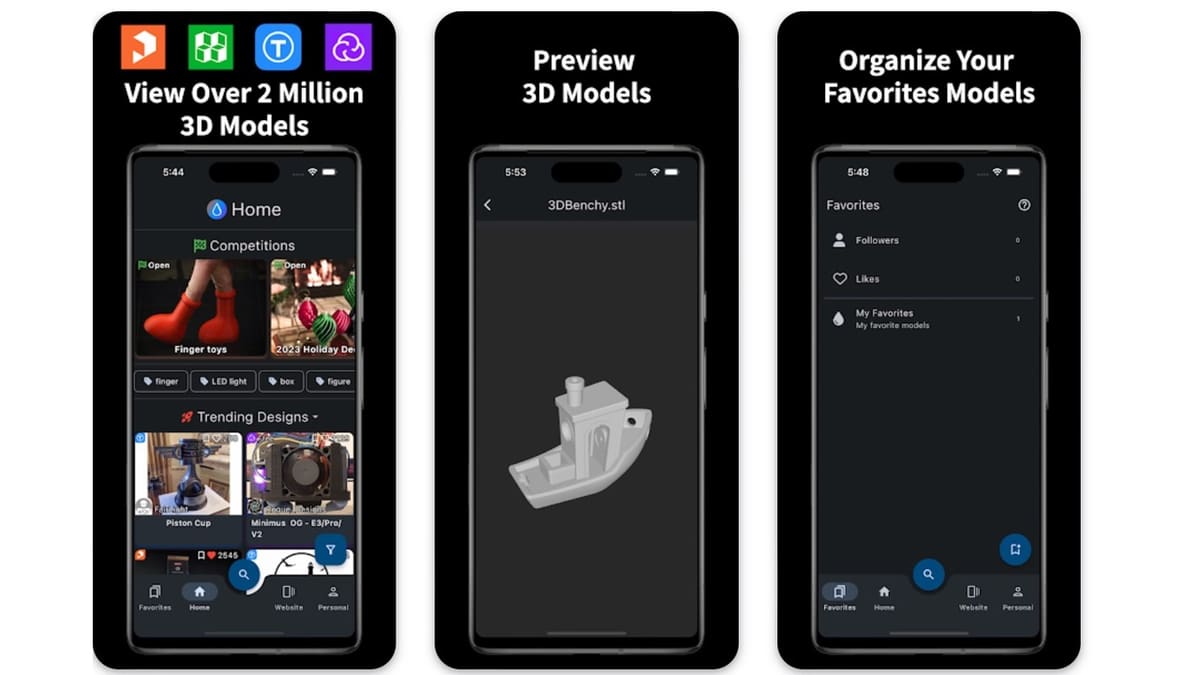
3Drop is a versatile app available for both iOS and Android that was designed to streamline the 3D printing experience. It searches for 3D models from four popular repositories: Thingiverse, Printables, MakerWorld, and Cults. To complete the process, the app allows you not to just see images of the models but also to instantly preview the actual 3D geometry.
One interesting feature is the presentation of ongoing competitions and trending models from these platforms, saving you time from visiting all websites to keep yourself informed. The app also offers synchronized favorites across all of these sources for easy access, so you can still interact with the community and keep track of the designs you enjoy.
Thinger
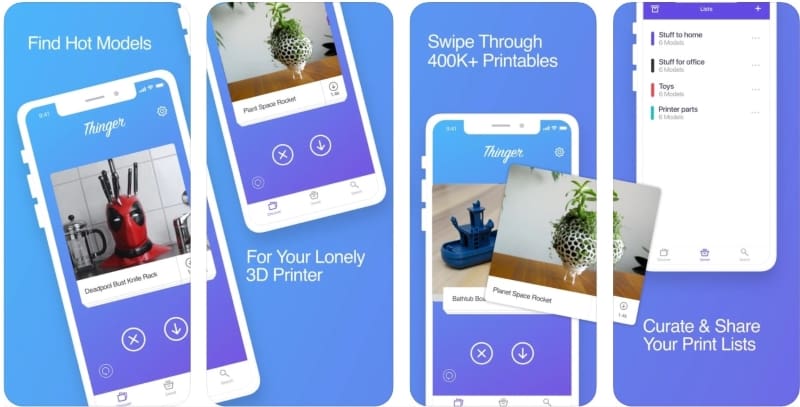
Tired of having to go from repository to repository to find your next printing project? If so, Thinger is the app for you. It can be a real timesaver when trying to search for a file.
Thinger aggregates 3D models from across the web from sites like Thingiverse, Yeggi, RepRap Facebook groups, and more. You can curate and share your own list, download and send STL files, and even view how many times a model has been saved or liked.
Toybox
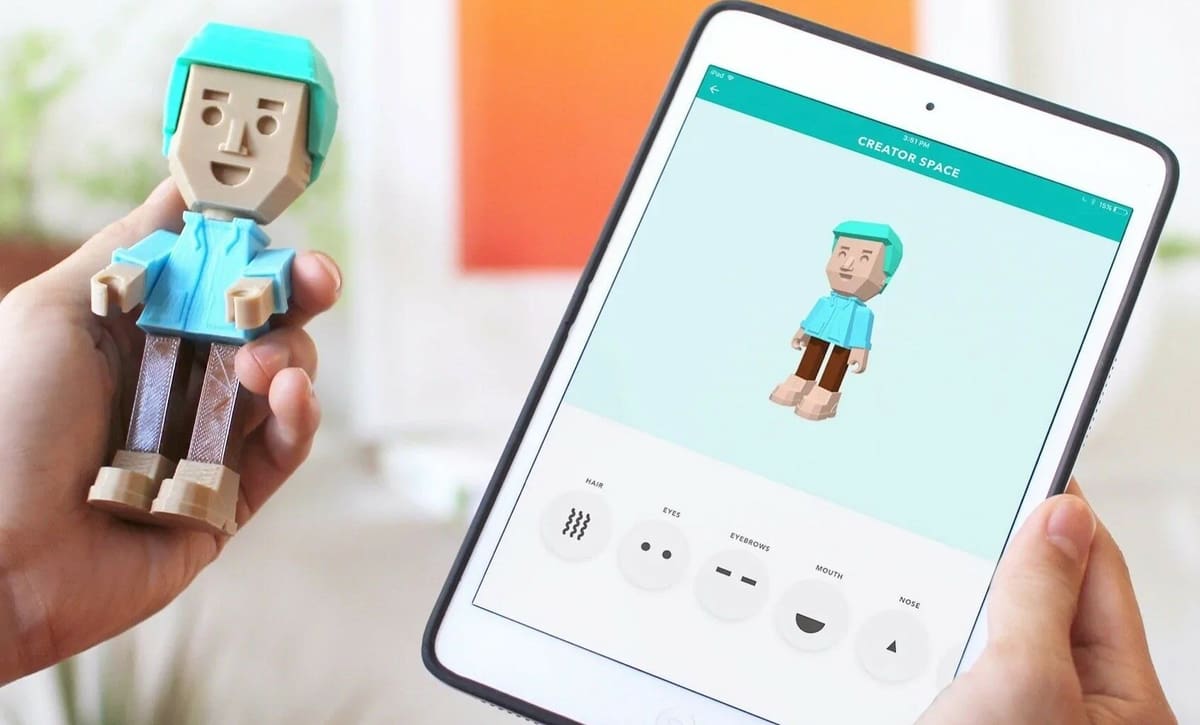
3D printing can be tough to get into, even for adults. For kids, it can be tricky and even dangerous! Toybox Labs aims to fix that with Toybox, an educational platform for kids to learn about 3D modeling and printing. Paired with their $300 3D printer, Toybox is a great way for kids to make and design their own toys. The Toybox printer, however, isn’t a necessity, as you can always export the STLs and print them on whatever type of printer you already have.
With the app, you can pick from a huge library of toy models or use the pre-built toy generators to customize and edit your own toys. There’s even a feature that enables you to draw your own design and create a model from the drawing. Toybox also has fun learning-based tutorials right in the app itself. With thousands of toys to choose from, you and your little ones will never be bored again!
3D Collection
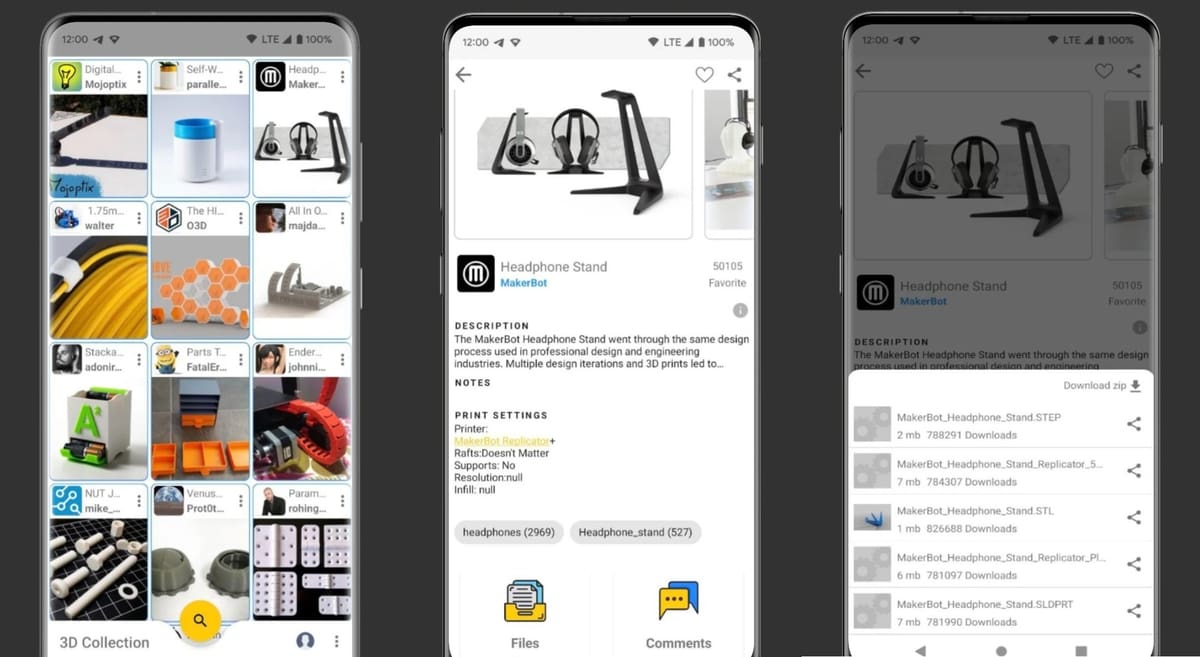
When looking for a 3D printable file, there are many places to look: Thingiverse, Printables, and MyMiniFactory, just to name a few. Crawling through each one looking for the perfect model can sometimes be a hassle. 3D Collection aims to streamline that process by combining the models from various websites, making it a one-stop shop for finding STLs.
Currently, the app aggregates files from Thingiverse, Cults, and MyMiniFactory, with more file repositories on the way. This app makes finding models a breeze with an easy-to-use interface, a free model filter, and a simple favorites list.
- Cost: Free
- Rating: 4.3/5 from 4,000+ reviews
- Requirements: None
- Where to get it: Android
3D Scanning Apps
3D scanning an object is a quick and easy way to replicate an object with complex, real-world geometries. Whether you’re designing an object with tight tolerances, or you just want to print a model of your face, these 3D scanner apps are worth a try.
Kiri Engine
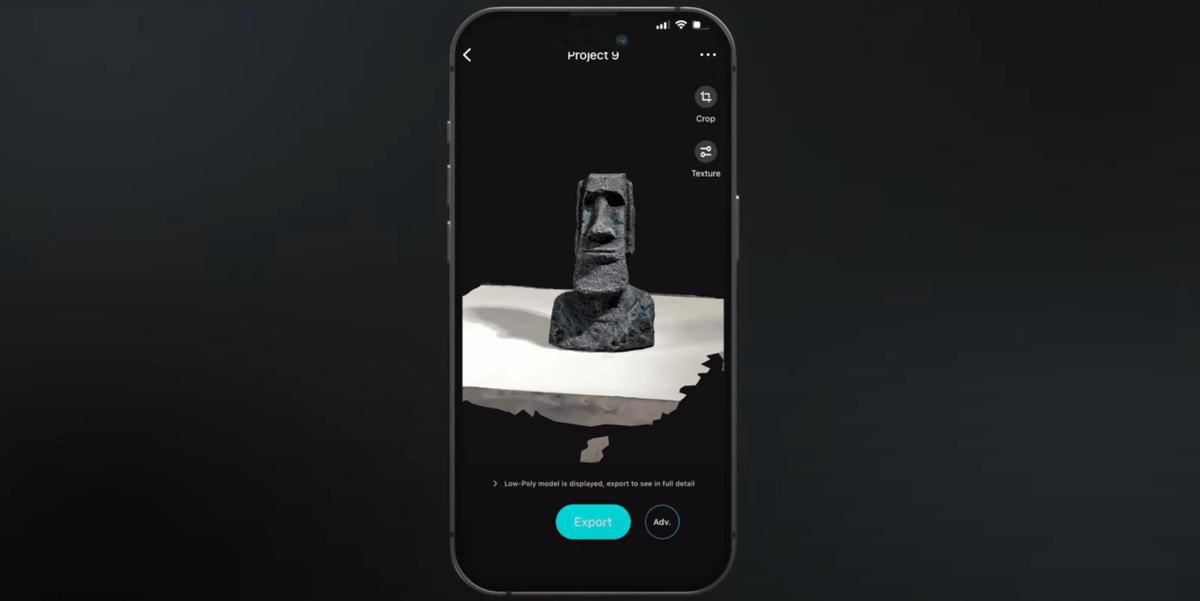
Kiri Engine creates 3D models through photogrammetry, transforming your photos into high-quality 3D models. Users can obtain a detailed 3D mesh in just minutes, from the scanning to the generating steps. The app also allows for editing, refining, and personalizing your creations.
The free version is functional, letting you do three exports per week. Kiri Engine is compatible with Blender and Unreal Engine and boasts advanced algorithms that provide scanning quality without Lidar sensors. It also features tools like 3D Gaussian Splatting, which allows users to get 3D visualizations with a video, scan, and capture all elements in your scene, including reflections. Additionally, it has a Discord community for sharing creations, feature voting, giveaways, and engaging with fellow enthusiasts.
Widar
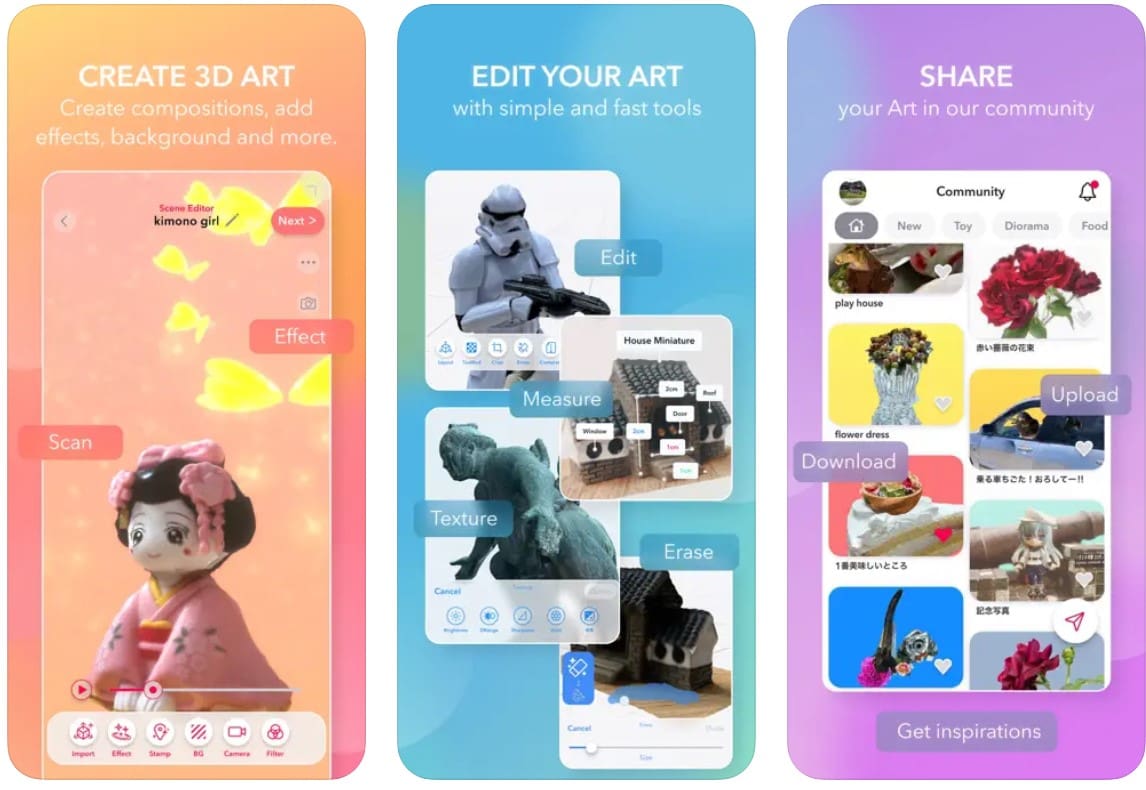
Widar is a powerful app with dual functionality: you can use it to both scan and edit various 3D models on your phone or tablet. Users rave about its practicality for photogrammetry thanks to the ability to create compositions, sculpt, and add effects right there in the app. When your piece is complete, you can share it directly to social media using the integrated functionality.
If you would like to export your scan for further work in a dedicated 3D modeling software, you have the option of OBJ and FBX file formats for usage with Maya, Blender, and Meshmixer, for example. It’s also compatible with game engines such as Unity. However, these external export options are only available with the upgrade to the Pro version for ~$10 per month.
While many users report that upgrading is worth the money, it’s always a good idea to explore the free version first and see if it could suit your needs before committing to a paid subscription.
Scandy Pro
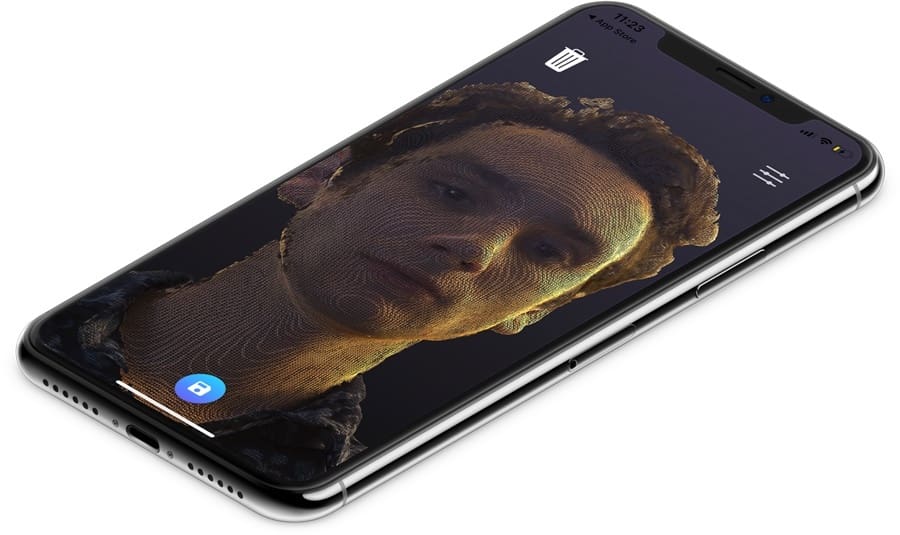
Even if you don’t have the newest iPhone version, you can still use it to scan in 3D. If you have an iPhone X or later, Scandy Pro can use the TrueDepth camera system – the technology behind Face ID – to take a high-quality 3D scan of your face or objects.
Meshes are generated in full color and in real-time, so you can scan areas in more detail and watch the mesh quality improve. You can edit your scans with their full-featured mesh editor and export them to a printable file format. An augmented reality feature allows you to project the model onto a space and take measurements of it.
While the app is free, exporting your scans is not. Users are limited to one free export of a scan per week. Additional scans can be purchased, or alternatively, you can pay a weekly, monthly, or yearly fee for unlimited scan exports and additional features.
- Cost: Freemium (one free export per week)
- Rating: 4.3/5 from 2,900+ reviews
- Requirement: iOS device with TrueDepth Cameras
- Platform: iOS
Polycam
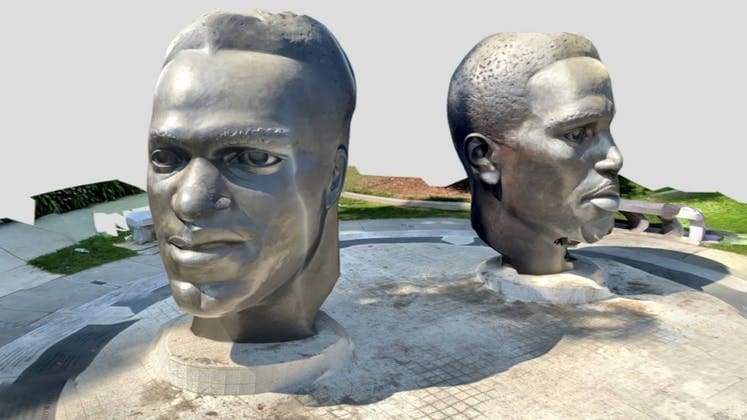
When it comes to 3D scanning apps, Polycam is one of the best. Using cameras and Lidar sensors, the app can capture full-color 3D scans of objects and environments. Since Polycam uses the Lidar sensors on the new 2020 iOS devices, you’re limited to using the app on an iPhone 12 Pro, iPhone 12 Pro Max, or 2020 iPad Pro (and newer Apple devices).
The Polycam colorization engine is accurate and fast, allowing you to make extremely high-quality scans in a matter of seconds. Because these scans are dimensionally accurate, you can use this app to measure dimensions with a tolerance of a few centimeters.
The app also lets you edit, resize, and project your scans into augmented reality for visualization. Export formats include STL, OBJ, or the point cloud from the Lidar sensor itself. Further, scans can be exported directly to Sketchfab.
- Cost: Free, Premium version ~$18 monthly or ~$100 annually
- Rating: 4.7/5 from 32,000+ reviews
- Requirement: Lidar-enabled iOS device
- Platform: iOS
License: The text of "Best 3D Printing Apps (Android & iOS): 19 Apps We Recommend" by All3DP is licensed under a Creative Commons Attribution 4.0 International License.

